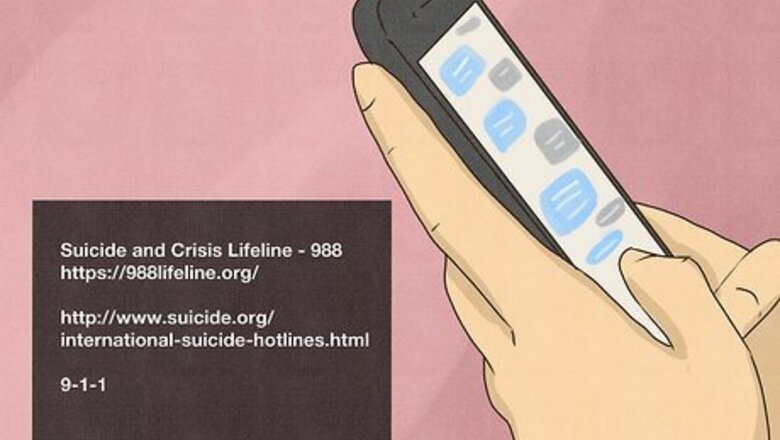
views
Getting Professional Help
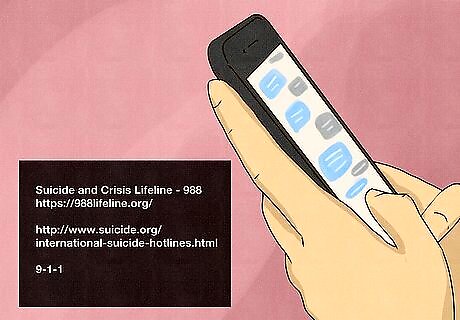
Call for help. If you are feeling depressed and don't feel life is worth living, contact a suicide prevention helpline. Talking with someone you don't know can sometimes ease the pain and isolation you're feeling. The hotlines will be able to direct you to services in your area if there is an immediate crisis. For immediate support that is available 24/7, contact the Suicide and Crisis Lifeline by calling or texting 988. Additionally, https://988lifeline.org/ has helpful resources. For international suicide hotlines, search your country listings here: http://www.suicide.org/international-suicide-hotlines.html If you or someone you know has recently attempted suicide and is currently in immediate danger, call 9-1-1 or the emergency number for the country you are residing in and request an officer trained in mental health.

See a mental health specialist. Seeking help from a counselor, therapist, or healthcare professional in your community is key. Thoughts of suicide after a recent rejection may be tied to other mental health conditions such as depression and anxiety. Seeking professional help will likely lead to better outcomes. Professional counselors or therapists focus on healing and can help you find ways to cope more effectively. Ask your primary care doctor for a referral to a highly qualified specialist, such as a psychologist, psychiatrist, or counselor. Search for a provider in your community. See if there are options for counseling through your school, an employee assistance program, or non-profit community centers. Most health insurance plans cover mental health services in the same way that medical services are covered. See if your insurance plan has mental health providers in your community that are covered under your insurance.

Join a support group. There are lots of others who are going through the same feelings as you. Support groups can help you through a divorce, relationship issues, or grief and loss. Seek information about community groups in your area that may help you to heal. You may be able to connect with support groups in these ways: Counseling centers that have support groups Church groups or other faith-based counseling support groups Online resources such as http://www.mentalhealthamerica.net or http://www.divorcecare.org

Consider group therapy. Group therapy is similar to a support group in that you join a group of people with similar experiences, but group therapy is led by a mental health professional instead of a volunteer. All members of the group gain support from each other while being guided and helped by the professional. Group therapy can give you perspective that one-on-one therapy may not. It will also give you a safe and confidential outlet for your feelings. Group therapy often costs money, but it may be covered under your health insurance.

Try medication. Your doctor may be able to see if any medical conditions are playing a role in your suicidal thoughts. Talk with your healthcare provider about any suicidal thoughts you are having and what current medications you are taking. You may benefit from a combination of medication and therapy in order to effectively handle your symptoms. Some symptoms are more severe than others. Discuss with a healthcare provider and mental health specialist openly about what has been working and not working for you. While your doctor may prescribe you medication themselves, you may also get a referral to a psychiatrist, who can give you more specialized help with medication.
Finding a Personal Support System

Talk with someone you trust. There are people that care about you. They will help to support you through this time. Trust that they may have advice about what you're feeling, and the rejection you've faced. You are not alone. Being with people that you care about will uplift your spirits. You may feel as though you want to be alone all of the time, but make an effort to interact and socialize with other people. While wanting to be alone is a natural response, you'll feel better in the long term if you keep socializing with other people. Don't be afraid to let out your emotions in front of the people you trust. It's okay to cry and be sad. If you are feeling like hurting yourself, talk with them about if they have been depressed about a loss before or had thoughts of suicide before. See if your friend can stay with you until those thoughts of suicide subside. Reader Poll: We asked 279 wikiHow readers who've gone through a difficult breakup, and only 6% of them agreed that the best way to cope is by seeking professional help. [Take Poll] You should absolutely seek professional help if you need it, but sometimes confiding in trusted friends and family members can help, too.
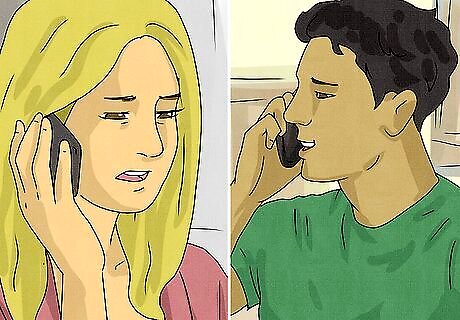
Ask for help. We all have been sad, afraid, lonely, frustrated, and annoyed at one point or another. Difficult times happen, and it’s about what you do when they occur. Taking control of your life and your emotions often means being willing to ask for help. Asking for help can mean a lot of different things. It’s not just about someone to talk with. Be with others when you’re feeling down. Ask them to visit or if it’s okay to visit them. Ask for time off or help with chores so you can focus on your own needs. Be with people you trust when you need some time off. See if others can help with chores while you focus on self-care.

Surround yourself with supportive people. Finding a support system during tough times is key. If you have been disconnected with friends or family after this break-up or recent rejection, then find ways to reconnect with those other important people in your life. Hang out more with your good friends or family on the weekend. Talk with close family members. Do things that you both enjoy. Avoid unsupportive, judgmental, or toxic people during this time. Consider finding new people to develop friendships with. Maybe someone who has been going through the same thing as you.

Practice self-love. While a recent break-up or rejection may feel like the end of the world, give yourself some time to heal. It's okay to be sad, but know that you can and will find other things or people that can make you happy again. Your worth is not based on one relationship or one person. Love yourself. You are worthwhile, and have many things to offer. Make a list of all of your best qualities. Keep them positive. Do you make other people laugh? Do you have any special talents? Remind yourself of how important you are to other people. If you are struggling with this, ask your friends and family for their input.
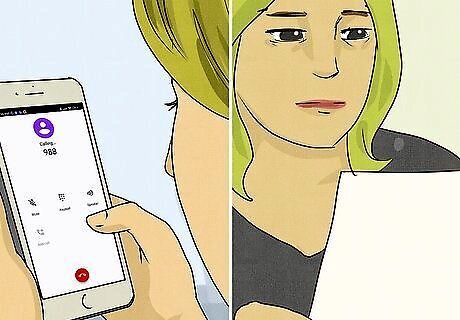
Create a safety plan. Suicide eliminates hope. And there is hope. By creating a safety plan if you have suicidal thoughts, then you will be more in control of your feelings. Here is an example of a safety plan, from the first to last plans of action: Create or read through a list of positives about yourself. Address the positive things in your life that you have to live for. Use various distractions to avoid suicidal thoughts. Get a good night's sleep. Delay any attempt for suicide. Wait 48 hours and continue with your safety plan. Have at least three people to call when feeling depressed. Call a friend/family member you trust. Call another person that you trust. Call your therapist or healthcare provider. Call a National Suicide Prevention Helpline if still in crisis. The US number is 988 (you can also text this number). Go to a place where you feel safe. Call an ambulance or go to an Emergency Room.
Taking Care of Yourself
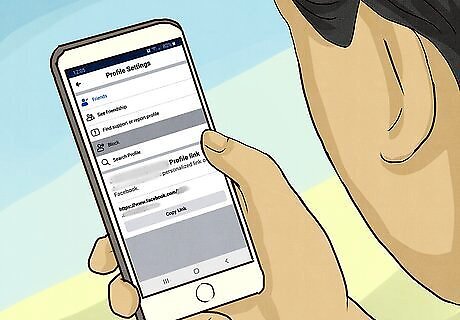
Separate yourself from your ex. Avoid contact with your ex. While you may feel like you want to call, text, chat, email, or see the person you love again, this will not likely help you to heal. After rejection, learn to reduce your thoughts of your ex. Find healthy ways to redirect your thoughts, so that you are less likely to contact your ex. Consider these ways: Delete their phone number, and block them from all of your social media profiles. Do something for 30 minutes when the thought enters your head to contact your ex. Watch TV, go for a walk, do household chores, or anything that can hold your attention for 30 minutes. Create a list of reasons why it's better to move on and be without this person who rejected you. Brainstorm three things that will help you see the bigger picture about the relationship. Find a “phone friend.” Talk with someone you trust who you can call, text, or chat with instead of your ex. Create a "distraction" box that helps you to remember good times before your ex. Fill this with things that are not associated with one person or group of people. This could be music, movies, funny pictures, or simple things.

Grieve rejection as a temporary loss. Everyone has experienced loss from one time or another. Rejection or the end of a relationship is connected to feelings of grief and loss. You may be going through this "grief process" but that does not mean it will last forever. Understand that taking your life is permanent, and but these feelings of loss are temporary. Rejection or loss can feel like a rollercoaster of emotions. But this rollercoaster can end with you safely getting off the ride and moving on. The pain of loss can feel personal, but remember that you can get better and find new love. Remember that love starts with yourself. Look back at your life, and consider other times when you were disappointed, held back, or unsuccessful. Consider how you have moved on since then and the successes that you have had despite those encounters. Realize that these feelings may eventually pass.

Focus on the future. Rather than dwelling on the past relationship, take control of what you can do to learn and heal from this experience. When you've been hurt, you may feel like hurting yourself in return. Remember that you can make it through this and heal your wounds. Don't become fixated on the past and your relationship. It will take time to feel better and know that you can if you break from the past. Each day is a new day to start fresh and to find new meaning in life. Take it one step at a time. Learn how your past can act as a guide to find new roads, but the past does not define your future.

Find new interests. There are many positive things that you can enjoy, even without the person you care about. Explore new things and do the things you're most passionate about. Avoid isolating yourself. Share time with others by doing things like: Take a class such as drawing, robotics, music, or martial arts. Find something that interests you. See what options are available in your community. Go to the gym. Join a fitness class. Participate in an intramural sports team. Go shopping. Find creative boutiques. Thrift stores. Bookstores. Interact with people with similar interests. Get outdoors. Find activity groups. Go to a local park. Walk a nature trail.

Adopt healthy habits. Be healthy in mind and body. Taking care of yourself also involves the basics of being healthy with your daily habits. Avoid habits that may make you feel worse about yourself. Love your body and do these things: Follow the treatment plan developed by your doctor and mental health professional. Sticking to this plan is your best chance to get better. Eat well. Drink lots of water. Avoid junk foods. Limit alcohol and drugs. Avoid the temptation to smoke or drink. They may make you feel worse long-term. Get a good night’s rest. Your body needs rest in order to heal. Create a bedtime routine that helps you to relax. Avoid using sleeping pills regularly. Use breathing exercises to relax you. Meditate. Pray. Try muscle relaxation techniques. Talk with a trusted friend or family member who makes you feel relaxed and happy.




















Comments
0 comment